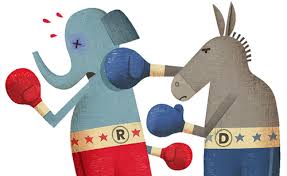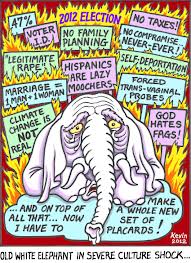"How to Defeat Conservatism," a list of 17 ways to "make the modern world a better place to live," is the finale to the series, "What's Wrong With Conservatism," by Philip E. Agre. Except for the last way, these tools are rhetorical ones rather than methods for candidates on the stump. We present a few of Agre's methods and urge you to see the rest of them at http://polaris.gseis.ucla.edu/pagre/conservatism.html:
"//5 How to Defeat Conservatism
"Conservatism is almost gone. People no longer worship the pharaohs. If the gentry were among us today we would have no notion of what they were talking about. For thousands of years, countless people have worked for the values of democracy in ways large and small. The industrialized vituperations of conservative propaganda measure their success. To defeat conservatism today, the main thing we have to do is to explain what it is and what is wrong with it. This is easy enough.
"* Rebut conservative arguments
"This is my most important prescription. Liberals win political victories through rational debate. But after a victory is won, liberals tend to drop the issue and move along. As a result, whole generations have grown up without ever hearing the arguments in favor of, for example, Social Security. Instead they have heard massive numbers of conservative arguments against liberalism, and these arguments have generally gone unrebutted. In order to save civilization, liberals need a new language, one in which it is easy to express rebuttals to the particular crop of conservative arguments of the last few decades. And the way to invent that language is just to start rebutting the arguments, all of them. This means literally dozens of new arguments each day.
"Do not assume that rebutting conservative arguments is easy, or that a few phrases will suffice. Do not even assume that you know what is wrong with the conservative arguments that you hear, or even indeed what those arguments are, since they are often complicated and confusing in their internal structure. Do not just repeat a stock response that worked for some previous generation of liberals, because your audience has already heard that response and already knows what the counterargument is. Conservative rhetors have invested tremendous effort in working around liberals' existing language. In the old days, racists were racists and polluters were polluters. But those old labels do not win arguments any more. Liberals must now provide new answers in plain language to the questions that ordinary citizens, having heard the arguments of conservatism, now have. Do environmental regulations work? Why do we protect the civil liberties of terrorists? Are liberals anti-American? What do we need government for anyway?
"* Say something new
"Conservative rhetors win audiences largely because the things they are saying seem new. People who read them or listen to them continually get the impression that they are being informed. If news and opinion editors seem biased against liberals, one reason is simply that liberals are not delivering the goods. Whenever you get ready to express a political opinion in the media, first ask whether you have ever heard that opinion in the media before (as opposed, for example, to scholarly works). If so, figure out what the counterarguments are -- because there will be counterarguments -- and then proceed to base your column on the counterarguments to that. Get ahead of the curve.
"* Teach logic
"Democracy requires that the great majority of citizens be capable of logical thought. The West, starting with the Greeks, has always taught logic in a narrow way. Logic does include the syllogism, but it also includes a great deal of savoir faire about what constitutes a good argument, a good counterargument, and a good counterargument to that. In particular, the citizen must have a kind of map of the arguments. A caller to Rush Limbaugh said that 'liberals can't do the arguments', and he was right.
"Many on the left unfortunately abandon reason because they believe that the actual basis of politics is something they call 'power'. People like this have no notion of what power is. For example, they will argue that reason is useless because the powers that be will not listen to reason. This is confusion. The purpose of reason is not to petition the authorities but to help other citizens to cut through the darkness of conservative deception.
"Others on the left believe that reason is the property of the elite. This is true historically, but that is simply because the essence of conservatism is to deprive the common people of the capacity to engage in democracy. Many bad theories of democracy actually reinforce conservatism, and this is one of them.
"* Conservatism is the problem
"Contemporary conservatism's discourse is engineered with tremendous sophistication to get past the specific arguments that liberals know how to make. Conservative strategists, moreover, are willing to achieve their goals incrementally, depending on the arguments that liberals are capable of making at a given moment. Of course it is important for liberals to make the arguments against each increment. But it is more important to explain what conservatism is in general, and then to explain what is wrong with it.
"For example, I once heard Rush Limbaugh discussing with a listener how school vouchers were just a conservative tactic, and how conservatives' real goal was to eliminate public funding for education altogether. This is the sort of thing that loses elections, and yet I have never heard a liberal pundit discuss it.
"* Critically analyze leftover conservative theories
"Liberal ideology is in disarray. After all, conservative ideology has dominated human thought for thousands of years, and it takes concentrated effort to liberate oneself from it. Such intellectual liberation will never happen without a detailed history of conservative theories -- which is to say, the ways in which these theories have been designed to subordinate people's minds to a hierarchical social order dominated by an aristocracy. Lacking such a history, liberal ideology draws in random and confused ways on conservatism, giving it a sentimental update without particularly changing it. Or else liberalism spins out into something wishfully called radicalism, which at best inverts conservatism into something that does not work as well and does not liberate anyone either. A genuine tradition of liberatory social thought does indeed exist, but it must be disentangled from its opposite.
"The difficulty with too many liberal notions of social capital is that they are oblivious to the tension between conservatism and democracy. As a result, they are vague and ambiguous as to the nature of social capital, how it might be measured, and what kinds of institutions might erode or encourage it. For example, a theory of social capital that locates it in plain numbers of social network connections is insufficient because it undervalues social skills and overvalues particularistic forms of community that are not adaptive in a dynamic modern economy. This is how liberals end up quoting Tocqueville and sounding indistinguishable from conservative theorists of 'intermediary institutions'.
"Social capital is just one example of a general crisis of liberal ideology. The first step in resolving this crisis to get clear about what conservatism is and what is wrong with it.
"* Ditch Marx
"Post-sixties, many liberals consider themselves to be watered-down Marxists. They subscribe to a left-to-right spectrum model of politics in which they, as democrats, are located in some hard-to-identify place sort-of-somewhat-to-the-left-of-center, whereas the Marxists have the high ground of a clear and definite location at the end of the spectrum. These liberals would be further out on the left if they could find a politically viable way to do it. Conservative rhetors concur with this model, and indiscriminately calling liberals communists is back in style. This is all nonsense. Marxism is not located anywhere on a spectrum. It is just mistaken. It fails to describe the real world. Attempts to implement it simply created an ugly and shallow imitation of conservatism at its worst. Democracy is the right way to live, and conservatism is the wrong way.
"Marx was a brilliant analyst for his time. His analysis of technology's role in the economy was wholly original. He was the first to analyze the structural dynamism of a capitalist economy. But his theory of modern society was superficial. It overgeneralized from the situation of its time: the recent discovery of economies of scale, crude market institutions, no modern separation of ownership and control, and a small middle class. Marx followed the political economy of his day in analyzing markets as essentially independent of the state. But this is not remotely the case.
"One difficulty with Marx, which is the topic of a vast literature, is that his theory requires a periodization of history that does not correspond to historical reality. Capitalism, for example, is supposed to be a discrete totality, but claimed starting dates for this totality range across a good four hundred years. His economistic analysis of society, though indisputably productive in the way that many powerfully wrong ideas are, makes history seem more discontinuous than it is. In fact, the relationship between conservatism and democracy is more or less constant throughout thousands of years of history. One evidence of this, for example, is Orlando Patterson's stunning discovery that Western notions of freedom were invented by former slaves in the ancient world and have remained more or less constant ever since.
"In economic terms, Marx's theory is mistaken because he did not analyze the role the capitalist plays as entrepreneur. The entrepreneur does an important and distinctive type of work in inventing new ways to bring together diverse factors of production. Now in fact the nature of this work has remained largely hidden throughout history for a wide variety of reasons. Because Marx had no notion of it, the capitalist's profit seemed to him simple theft. It does not follow, though, that entrepreneurs earn all of their money. The theories of mainstream economics notwithstanding, serious how-to manuals for entrepreneurs are quite clear that the entrepreneur is trying to identify a market failure, because market failures are how you make money. The relationship between entrepreneurship and the state is much more complicated than economics has even tried to theorize. Capitalists, moreover, are not a class. Particular networks of capitalists and other well-off or otherwise connected personages may well try to constitute themselves as an aristocracy, but this is a phenomenon with several more dimensions than just economics.
"Nor is Marxism of any use as politics. All that Marx offered to people who worked in deadening factory jobs was that they could take over the factory. While unions and collective bargaining exist in many contexts for good economic reasons, they are an essentially medieval system of negotiations among orders and classes. They presuppose a generally static economy and society. They are irrelevant to knowledge-intensive forms of work. Nor do they provide any kind of foundation for democratic politics. People want their kids to be professionals, not factory workers, and democracy helps people to knit themselves into the complicated set of institutions that enable people to build unique and productive lives.
"* Stop surrendering powerful words
"Many liberals abandon any word that conservatives start using. That means, since conservatives systematically lay claim to every word of the English language, that liberals have been systematically surrendering powerful words such as family, nation, truth, science, tradition, and religion. This has made it increasingly difficult for liberals to explain what they believe. There is no alternative: if conseratives have been twisting a powerful word, then you have to explain in concise American English what the word really means and how the conservatives have distorted it. Contest the signifiers. Use the words.
"* Teach nonviolence
"The spiritual leader of modern liberalism, Martin Luther King, taught nonviolence. This has been narrowly construed in terms of not killing people. But, as King made clear, it has other meanings as well. You have to love your enemies. This is difficult: the reality of conservatism is so extreme that it is difficult even to discuss without sounding hateful. There is also an intellectual dimension to nonviolence. Nonviolence means, among other things, not cooperating in the destruction of conscience and language. Nonviolence implies reason. Analyze the various would-be aristocracies, therefore, and explain them in plain language, but do not stereotype them. Nonviolence also has an epistemological dimension. Few of us have the skill to hate with a clear mind. Conservatism is very complicated, and you cannot defeat it by shouting slogans. This is the difficulty with Michael Moore. He talks American, which is good. But he is not intellectually nonviolent. He is not remotely as bad as Ann Coulter, and liberals have criticized him much more thoroughly than conservatives have criticized Ann Coulter. But he is not a model for liberal politics. There is no doubt that Martin Luther King would (have been) in George Bush's face. But how? That is why liberals need a language.
"* Tell the taxpayers what they are getting for their money
"Civilization requires a substantial number and variety of public services, which in turn require moderate and reasonable amounts of taxes. Despite decades of conservative rhetoric, a majority of Americans are perfectly happy to pay their taxes. And yet liberals keep letting conservatives clobber them with rhetoric that makes taxes sound like a bad thing. It is time for liberals to stop losing this argument. To start with, do not talk about amounts of money ('we should spend $15 billion on health care'). Instead, talk about what the money buys ('we should provide medical care to 15 million children').
"* Build the Democratic Party
"Your model should be Pat Robertson. He is as extreme on the right as anybody in the United States is on the left. Yet his people took over large parts of the Republican Party. They did this in three ways: laboriously designing a mainstream-sounding language, identifying large numbers of talented activists and training them in the day-to-day work of issue and party politics, and building their own communications systems. Liberals should do the same.
"Now, many liberals argue that the Democratic Party would magically start winning again if it would only move to the left. This is lazy nonsense. The Democratic Party has moved to the right for the simple reason that liberals do not have a language that wins elections. To take over the Democratic Party, liberals need to replace the left-wing policies that do not work and, for the policies that do work, get a language that moves 51% of likely voters to vote Democratic.
"Other liberals argue that the Democratic Party, and the 'system' in general, are irretrievably broken, and that they must build a third party, such as the Green Party with its endorsement of Ralph Nader. The difficulties with this notion are hard to count. For one, splitting the left is a certain recipe for centuries of aristocratic domination. For another, building a party with only people who share your opinions to the nth degree is a certain recipe for factionalism and isolation. For another, the Green Party is a chaotic mess that has no serious chance of becoming a mass-based political party.
"Life under aristocratic domination is horrible. The United States is blessed to have little notion of what this horror is like. Europe, for example, staggered under the weight of its aristocracies for thousands of years. European aristocracies are in decline, and Europe certainly has its democratic heroes and its own dawning varieties of civilized life, and yet the psychology and institutions that the aristocracies left behind continue to make European societies rigid and blunt Europeans' minds with layers of internalized oppression. People come to America to get away from all of that. Conservatism is as alien here as it could possibly be. Only through the most comprehensive campaign of deception in human history has it managed to establish its very tentative control of the country's major political institutions. Conservatism until very recently was quite open about the fact that it is incompatible with the modern world. That is right. The modern world is a good place, and it will win."
The Final Solution is, of course, to criminalize Conservatism. The tools that Agre argues for are to use when combating Sheeplets in forums, and for candidates for political office to use. When Conservatism is dead, the use for the tools will die too.
-----------------------------------------------------------------------------------------------------------------------
"To the dumb question, 'Why me?' the cosmos barely bothers to return the reply,
'Why not?'"
Christopher Hitchens
-----------------------------------------------------------------------------------------------------------------------






